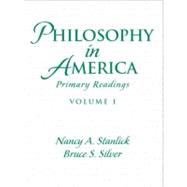
Volume I
(NOTE: Each chapter contains an Introduction, Study Questions, and Suggestions for Further Reading.)
I. AMERICAN METAPHYSICS AND EPISTEMOLOGY.
II. AMERICAN ETHICS, SOCIAL AND POLITICAL PHILOSOPHY.
Volume I
The New copy of this book will include any supplemental materials advertised. Please check the title of the book to determine if it should include any access cards, study guides, lab manuals, CDs, etc.
The Used, Rental and eBook copies of this book are not guaranteed to include any supplemental materials. Typically, only the book itself is included. This is true even if the title states it includes any access cards, study guides, lab manuals, CDs, etc.